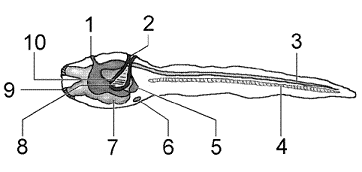The organism in Figure 32-1 is a representative of:

a. the phylum Hemichordata.
b. the phylum Echinodermata.
c. the phylum Chordata.
d. the subphylum Urochordata.
e. the subphylum Cephalochordata
C
You might also like to view...
The first human genetic disease to be successfully treated by gene therapy was ________
A) cystic fibrosis B) sickle cell anemia C) chronic myelogenous leukemia D) adenosine deaminase deficiency E) albinism
In the Calvin-Benson cycle,
a) oxygen is used to synthesize sugars. b) carbon dioxide is used to synthesize sugars. c) glucose is oxidized. d) ADP is converted to ATP.
A theory is a(n)
A) idea that has been proven. B) concept in the early stages that still needs to be tested. C) description of a belief that invokes the supernatural. D) explanation of an idea that is broad in scope and supported by a large body of evidence.
What is true of eudicots but not monocots?
A. eudicots have venation that is parallel to the leaf axis B. eudicots have flower parts usually in multiples of four or five C. eudicots have vascular bundles scattered in their stems D. eudicots have stomatal pores but monocots do not E. eudicots have true seed leaves but monocots do not